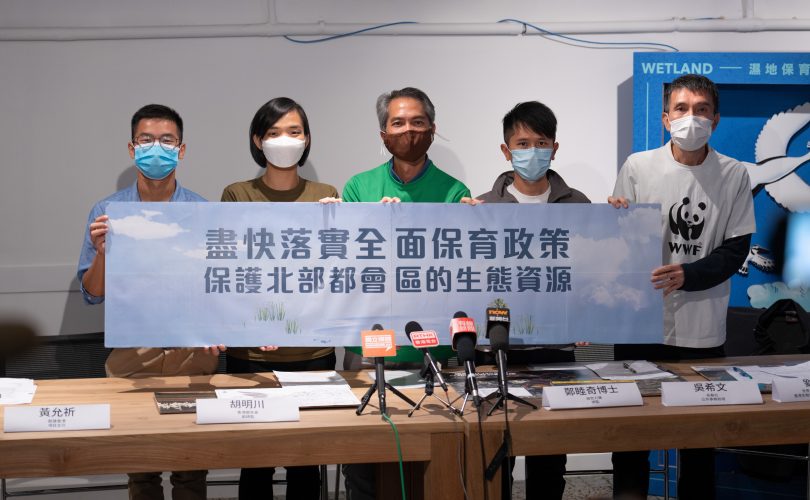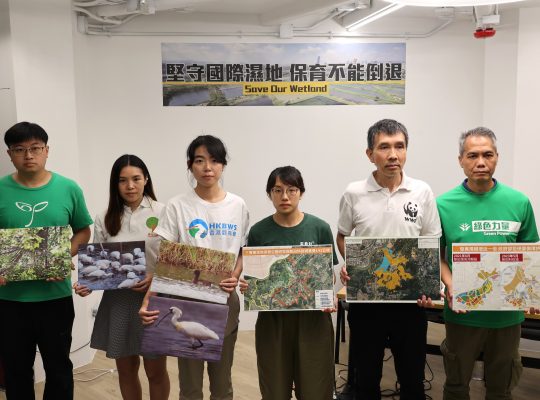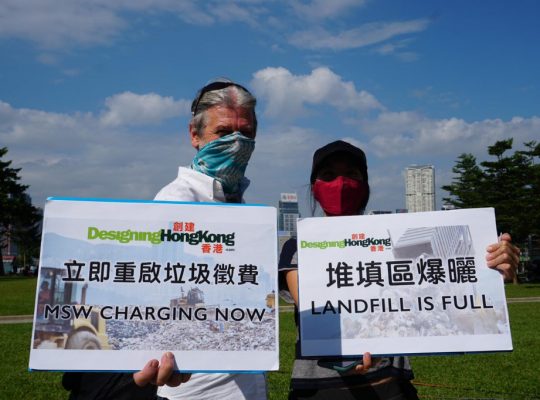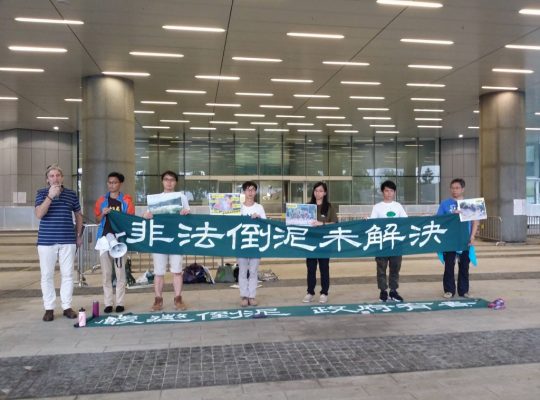Photo credit: WWF-Hong Kong
Joint green group recommendations on Northern Metropolis Strategy:
A call for a holistic conservation policy and timetable for the protection of sites of conservation importance
We appreciate and welcome the proactive conservation measures proposed by the Government under the Northern Metropolis Strategy, including the resumption of private fishponds and other wetlands in the Deep Bay area in the Northwestern New Territories under the Land Resumption Ordinance (Cap. 124). However, the Northern Metropolis also has been planned to host a population of about 2.5 million people. With development at such mammoth scale, we consider that a series of measures and actions are required to ensure current conservation efforts are not compromised by developments in the Northern Metropolis area before and during the planning, construction and operation phases. Thus, we urge the Chief Executive and her teams to take the following measures in regard to the nature conservation issues of the Northern Metropolis Strategy:
1. Recognise and protect sites of conservation importance through effective policies and regulations
● We support the Government’s commitment to resume private land under the Land Resumption Ordinance (Cap. 124) for the public purpose of nature conservation.
● We appreciate the establishment of Wetland Conservation Parks (WCPs) to conserve and manage 2,000 hectares of ecologically important wetland ecosystems and enhance the ecological value of the area.
● We ask for an extension of the Ramsar Site to cover all the ecologically important wetland ecosystems in the Deep Bay area and continue to work with the Shenzhen side to protect the wetland habitats in Deep Bay / Shenzhen Bay.
● We suggest the Government adopt a holistic conservation approach to enhance the integrity of the Deep Bay wetland ecosystem.
● All fishponds and other wetlands within the existing “Wetland Conservation Area” designated under the Town Planning Board Planning Guideline No. 12C must be included in the WCPs.
● The proposed Robin’s Nest Country Park should be expanded from about 500 hectares to 1,120 hectares . This would properly establish the ecological corridor that will connect terrestrial habitats in Shenzhen – particularly Wutong Shan – with Pat Sin Leng Country Park and thereby to Hong Kong’s wider Country Park Network.
● We recognise the role and functions that farmland plays in our local food supply and in nature conservation. Therefore, we recommend the government to safeguard active farmlands and abandoned farmlands with good potential for rehabilitation to promote sustainable agriculture and biodiversity.
2. Alleviate development pressure on sites of conservation importance
● Impacts arise from any development projects in all ecologically important sites and habitats, including but not limited to Sites of Special Scientific Interest (SSSI), Conservation Area (CA), Coastal Protection Area (CPA), Green Belt (GB), natural stream, mudflat, fishponds, egretry and other areas with important species recorded in any ecological studies, should be greatly avoided and minimized.
● Being mindful of ‘edge effects’ which the quality of the habitat to be conserved would be affected by the surrounding development, there must be a buffer between ecologically important sites and planned developments. We affirm the value of buffer zone and specifically the Wetland Buffer Area as an important part of the conservation strategy currently adopted for the alleviation of development pressure in the Deep Bay area, including the future development of the Northern Metropolis.
● As a genuine commitment, conservation initiatives in the Northern Metropolis, particularly WCPs, must not be environmental and ecological ‘compensations’ for any future development projects in Northern Metropolis. The wetlands will represent ‘green spaces’ that add value and contribute to the health and well-being of the people in the Northern Metropolis and in Hong Kong, and will be safe havens for Hong Kong’s biodiversity. They will also make significant regional and global contributions to conserving global biodiversity by providing critically important habitats for the migratory birds that use the East Asian-Australasian Flyway.
● The Town Planning Board Planning Guideline No. 12C should be maintained and followed, including the principles of “no-net-loss in wetland” and “precautionary approach” to maintain a continuous coverage of fishponds in the wetland landscape, and to maintain ecological connectivity therein, when developing the Northern Metropolis.
● Existing legal framework for nature conservation, environmental protection, planning and land use, including but not limited to the Environmental Impact Assessment Ordinance (Cap. 499), Town Planning Ordinance (Cap. 131), Water Pollution Control Ordinance (Cap. 311), Hong Kong Planning Standards and Guidelines, should be maintained and followed in the establishment of WCPs and all developments.
● In any review of relevant ordinances, we insist effectiveness should not be sacrificed to efficiency, and that provision for public consultation should be retained.
● Mainstreaming and integrating biodiversity, climate resilience and other environmental considerations in the planning process of the Northern Metropolis is important to truly reduce the negative impacts of habitat degradation and climate change in advance at the policy and planning level.
3. Ensure no ecological degradation during the transition from policy announcement to designation of protected areas
● Private landowners may have expectations for the land resumption process and may change the operation of the fishponds or wetlands, which may have potential adverse impacts on the overall ecological value of the Deep Bay wetlands. There should be measures to maintain and enhance the existing ecological values of wetlands during the transitional period and a timeframe for land resumption should be prepared.
● We recognise the contribution of fishermen in maintaining the operation of fishponds active in the Deep Bay area. Their livelihood and experience in fish farming should be treasured and respected, and their engagement as stakeholders and managers of the fishponds and wetlands is crucial to the maintenance and management of the WCPs.
● We request an ecological study prior to the planning of Northern Metropolis with a clear timeframe to avoid loss of wetlands. All data and findings of the study to assess the current wetland status must be shared with the public and concerned green groups for transparency and effective coordination and collaboration.
4. Ensure the protected areas are planned, established, and managed for conservation
● There should be a detailed study into the delineation of the boundary of WCPs and buffer area to safeguard the connectivity and function of the wetland ecosystem.
● Conservation should come first in the planning and management of the WCPs, with minimal built-up areas.
● Any infrastructure or horticulture within the proposed WCPs must promote, rather than segment the contiguity of the current wetland landscape and compromise the ecological integrity to the Deep Bay wetland ecosystem.
● Any proposed recreation and public education facilities and activities should not cause any loss of wetland and undermine the nature conservation objectives of the WCPs, and their planning, design, construction and operation should be adequately and properly regulated and managed.
● Common conservation goals for the proposed WCPs should be formulated through a holistic, landscape-scale conservation strategy and policy.
● Sufficient funding should be committed and allocated for management and operation of this wetland system and particularly the WCPs. A working group should be established in the design stage to proactively address potential and foreseeable environmental and ecological issues in the proposed parks during the construction and operation phases.
Co-organised groups (in alphabetical order):
The Conservancy Association
Designing Hong Kong
Green Power
Hong Kong Bird Watching Society
WWF-Hong Kong
《北部都會區發展策略》環團聯合聲明:
促請政府制定全面保育政策及時間表 保護具保育價值地點
我們歡迎政府於《北部都會區發展策略》提出的積極保育措施,包括動用《收回土地條例》(第124章)收回新界西北部后海灣私人擁有的魚塘和其他濕地。但是,北部都會區計劃將容納約250 萬人,如此龐大的發展規模需要一系列的措施和行動,以確保在北部都會區的規劃、建設和運營階段,當前的保育工作及努力不會因為發展而受到影響。因此,我們希望就《北部都會區發展策略》當中的自然保育議題,促請特首及其團隊採取以下措施:
一、透過有效的政策和法規,認可和保護具有重要保育價值的地點
● 我們支持政府承諾透過《收回土地條例》(第 124 章)徵收私人土地,以作自然保育公共用途。
● 我們支持建立濕地保育公園以保護管理 2,000 公頃具有重要生態價值的濕地生態系統,甚至提高該區的生態價值。
● 我們建議擴展拉姆薩爾濕地範圍以覆蓋后海灣具重要生態價值的濕地生態系統,並繼續與深圳相關部門合作,共同保護后海灣/深圳灣的濕地生境。
● 現有《城市規劃委員會規劃指引編號12C》所設訂「濕地保育區」內的所有魚塘和其他濕地必須包括在濕地保育公園的範圍內。
● 我們建議政府採取全面的保育策略,提升后海灣濕地生態系統的完整性。擬議的紅花嶺郊野公園應由約 500 公頃擴大至 1,120 公頃,連接深圳的陸地生境(尤其是梧桐山一帶)與香港八仙嶺郊野公園及更廣泛的郊野公園網絡,進一步加強兩地的生態走廊。
● 農地在本地食品供應和自然保育有重要作用和功能。因此,我們建議政府保護現時耕作中的農田和具有良好復耕潛力的荒廢農地,以促進可持續農業及生物多樣性。
二、緩和發展對具重要保育價值地點所帶來的壓力
● 任何發展項目必須盡量避免和減少對具重要生態價值地點造成的影響,包括但不限於:具特殊科學價值地點 (SSSI)、保護區 (CA)、海岸保護區 (CPA)、綠化帶 (GB)、天然河流、泥灘、魚塘、鷺鳥林和在其他生態研究中錄得過重要物種的地點。
● 由於棲息地會受附近發展項目的影響,所以「邊緣效應」需納入考慮中。具重要生態價值的地點與規劃中的發展項目之間必須設立緩衝區。我們重申,緩衝區的價值與必要性不容忽視,應作為緩和后海灣及未來北部都會區發展壓力的重要保育策略。
● 為落實北部都會區保育措拖的承諾,濕地保育公園不應成為北部都會區未來任何發展項目的環境或生態「補償」。濕地將成為「綠色空間」,不僅能夠造福於未來北部都會區甚至全香港的市民,還能提升香港的生物多樣性。香港的濕地還將為東亞-澳大利西亞遷飛區的候鳥提供重要的棲息地,為維護全球生物多樣性作出重大貢獻。
● 維持和遵守城規會規劃指引編號12C ,包括「濕地零淨損失」和「防患未然 」的原則,保留濕地景觀中連綿覆蓋的魚塘,並在發展北部都會區時,維持這些魚塘的生態連接性。
● 建立濕地保育公園及發展其他項目時,保持和遵循現時自然保育、環境保護、規劃和土地使用的法律架構,包括但不限於《環境影響評估條例》(第 499 章)、《城市規劃條例》(第 131 章)、《水污染管制條例》(第 311 章) 和《香港規劃標準與準則》。
● 任何相關條例的檢討及修訂都不應為了效率而犧牲效力,公眾諮詢應予以保留。
● 於北部都會區的規劃階段將生物多樣性、氣候適應力和其他環境考慮因素整合並納入主流將有效減輕棲息地退化和氣候變化的不良影響。
三、確保政策公布到保護區劃定過渡期間不會有生態損失
● 私人土地擁有人可能對收地有期望,或會改變魚塘或濕地的運作,這可能對后海灣濕地的整體生態價值產生不良影響。政府應於過渡期間採取措施保持現有濕地生態價值,並制定收回土地的時間表。
● 漁民對后海灣魚塘運作及維護濕地的生態價值功不可沒。他們養魚的生計和經驗應該得到珍惜和尊重。身為魚塘和濕地的持份者和管理人,漁民的參與對濕地保育公園的保養和管理至關重要。
● 我們要求在規劃北部都會區之前進行生態研究,並定立明確的時間表以避免濕地喪失。為提高透明度,達至有效的協調,政府必須與相關關注團體分享生態研究的所有數據和研究結果。
四、確保保護區的規劃、成立和管理以保育為目標
● 開展針對濕地保育公園邊界和緩衝區劃分的詳細研究,以保障濕地生態系統的連接性和功能。
● 在濕地保育公園的規劃和管理中,保育優先考慮,將建築工程減到最少。
● 在擬議中的濕地保育公園內,任何基礎設施或園藝必須促進現有濕地景觀的連接性,不能損害整個后海灣濕地生態系統的生態完整性。
● 任何擬建的康樂和公共教育設施和活動都不應造成任何濕地損失或低估濕地保育公園的自然保育目標,其規劃、設計、建設和運營應得到適當的監管和管理。
● 擬議濕地保育公園的共同保育目標應透過全面、景觀規模的保育策略和政策制定。
● 為此濕地系統,尤其是濕地保育公園的管理和運營承諾和分配足夠的資金。在設計階段成立工作小組,在建設和運營階段積極解決擬建公園潛在和可預測到的環境和生態問題。
五個發起團體:
長春社
創建香港
綠色力量
香港觀鳥會
世界自然基金會香港分會
(以英文名稱順序排列)







